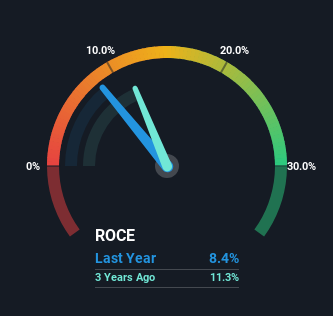There Are Reasons To Feel Uneasy About Trade Desk's (NASDAQ:TTD) Returns On Capital
Did you know there are some financial metrics that can provide clues of a potential multi-bagger? Firstly, we'll want to see a proven return on capital employed (ROCE) that is increasing, and secondly, an expanding base of capital employed. Put simply, these types of businesses are compounding machines, meaning they are continually reinvesting their earnings at ever-higher rates of return. Although, when we looked at Trade Desk (NASDAQ:TTD), it didn't seem to tick all of these boxes.
Understanding Return On Capital Employed (ROCE)
If you haven't worked with ROCE before, it measures the 'return' (pre-tax profit) a company generates from capital employed in its business. Analysts use this formula to calculate it for Trade Desk:
Return on Capital Employed = Earnings Before Interest and Tax (EBIT) ÷ (Total Assets - Current Liabilities)
0.084 = US$200m ÷ (US$4.9b - US$2.5b) (Based on the trailing twelve months to December 2023).
Thus, Trade Desk has an ROCE of 8.4%. On its own, that's a low figure but it's around the 8.8% average generated by the Media industry.
See our latest analysis for Trade Desk
In the above chart we have measured Trade Desk's prior ROCE against its prior performance, but the future is arguably more important. If you'd like to see what analysts are forecasting going forward, you should check out our free analyst report for Trade Desk .
What Can We Tell From Trade Desk's ROCE Trend?
On the surface, the trend of ROCE at Trade Desk doesn't inspire confidence. Around five years ago the returns on capital were 27%, but since then they've fallen to 8.4%. However, given capital employed and revenue have both increased it appears that the business is currently pursuing growth, at the consequence of short term returns. And if the increased capital generates additional returns, the business, and thus shareholders, will benefit in the long run.
On a side note, Trade Desk has done well to pay down its current liabilities to 51% of total assets. So we could link some of this to the decrease in ROCE. Effectively this means their suppliers or short-term creditors are funding less of the business, which reduces some elements of risk. Since the business is basically funding more of its operations with it's own money, you could argue this has made the business less efficient at generating ROCE. Keep in mind 51% is still pretty high, so those risks are still somewhat prevalent.
The Bottom Line On Trade Desk's ROCE
Even though returns on capital have fallen in the short term, we find it promising that revenue and capital employed have both increased for Trade Desk. And the stock has done incredibly well with a 341% return over the last five years, so long term investors are no doubt ecstatic with that result. So should these growth trends continue, we'd be optimistic on the stock going forward.
Trade Desk could be trading at an attractive price in other respects, so you might find our free intrinsic value estimation for TTD on our platform quite valuable.
While Trade Desk may not currently earn the highest returns, we've compiled a list of companies that currently earn more than 25% return on equity. Check out this free list here.
Have feedback on this article? Concerned about the content? Get in touch with us directly. Alternatively, email editorial-team (at) simplywallst.com.
This article by Simply Wall St is general in nature. We provide commentary based on historical data and analyst forecasts only using an unbiased methodology and our articles are not intended to be financial advice. It does not constitute a recommendation to buy or sell any stock, and does not take account of your objectives, or your financial situation. We aim to bring you long-term focused analysis driven by fundamental data. Note that our analysis may not factor in the latest price-sensitive company announcements or qualitative material. Simply Wall St has no position in any stocks mentioned.

 Yahoo Finance
Yahoo Finance 
